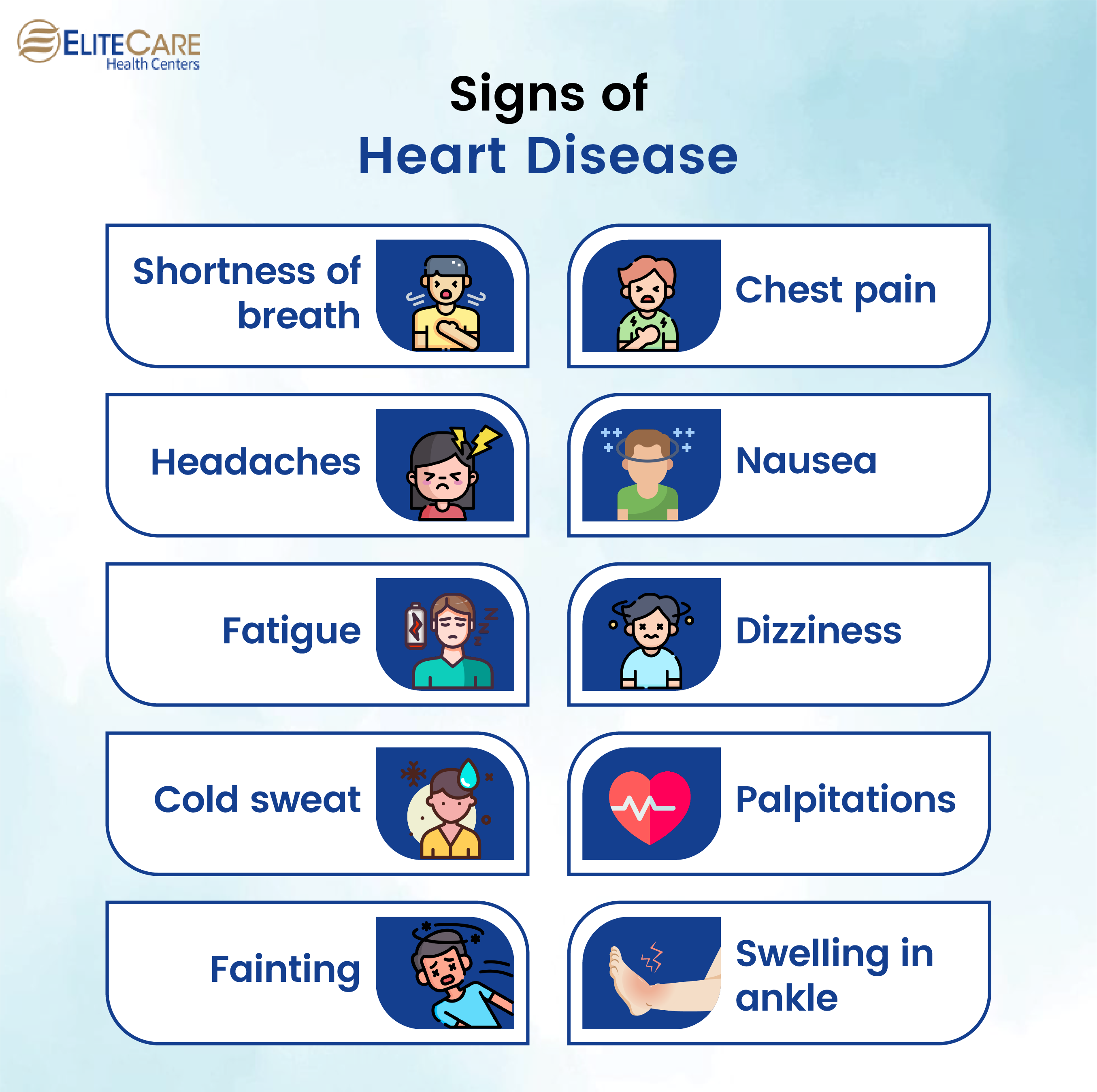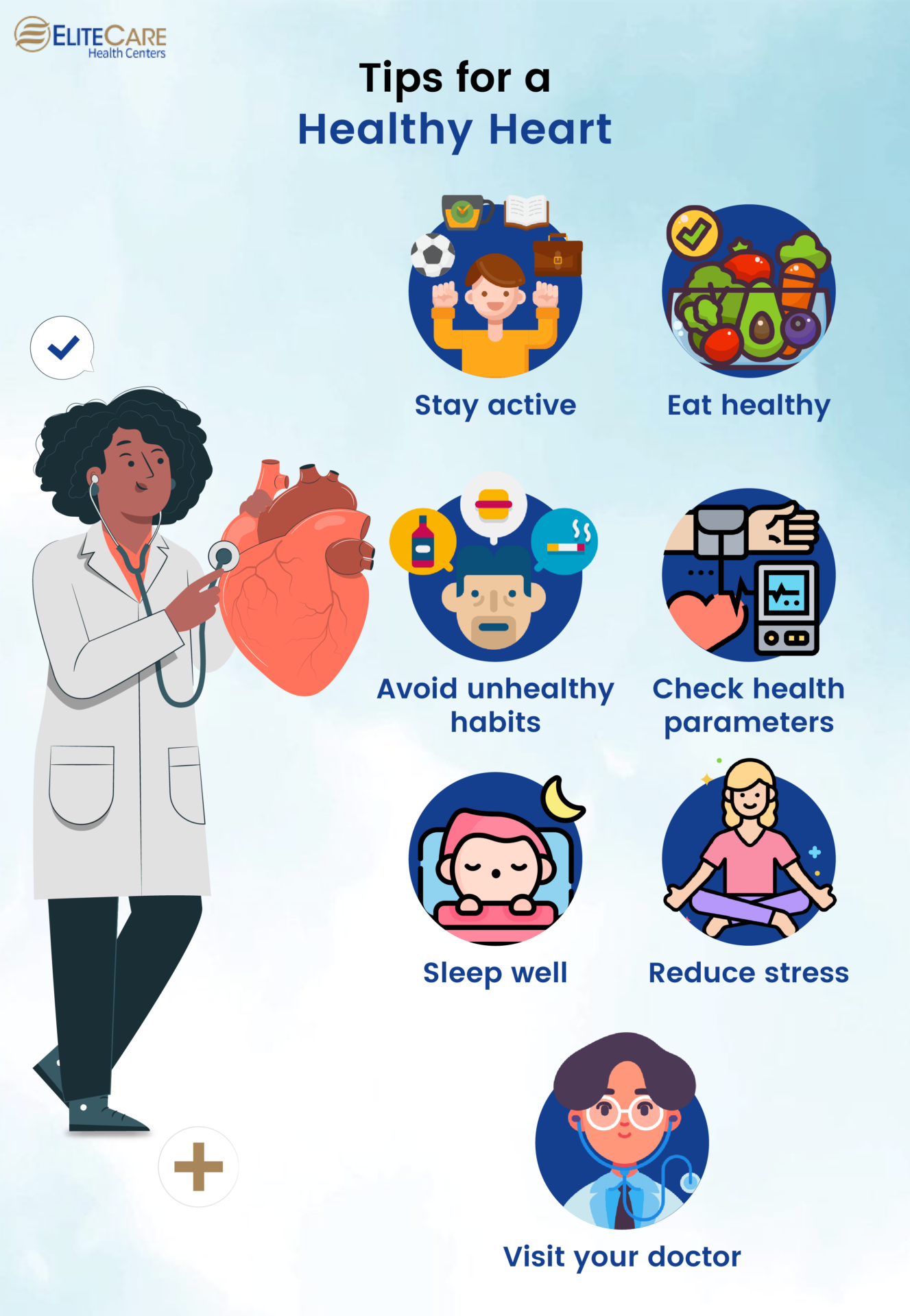
A strong pulse and a regular heartbeat are signs of a healthy heart. But as we age, the main artery from the heart (aorta) and blood vessels become thicker, stiffer, and less flexible. Hence, it causes resistance to proper blood flow and results in high blood pressure. The valves inside the heart, which control the direction of blood flow, also thicken and become stiffer over time. Therefore, putting us at a significantly higher risk for heart disease as we age. The Centers for Disease Control and Prevention has stated that an estimated 14.2% of adults aged 45 years and older reported having coronary heart disease (CHD), a stroke, or both.
Heart disease often develops over time and the symptoms may vary for each individual. Recognizing the warning signs can prevent the elderly from developing further health complications.
Signs of Heart Disease

- Shortness of breath
- Chest pain during physical activity
- Headaches
- Nausea/vomiting
- Tiredness or fatigue
- Lightheadedness, dizziness, or confusion
- Cold sweats
- Swelling of the stomach, neck, feet, ankles, or legs
- Loss of consciousness
- Palpitations
- Reduced ability to exercise
7 Healthy Heart Tips for Seniors

Heart disease can be life-threatening if left unattended for a long time. But it can be easily managed by making a few healthy lifestyle choices. Here are 7 health tips for adults to maintain a healthy heart.
1. Stay physically active
The most effective heart-healthy tip for adults is regular exercise. The heart needs at least 30 minutes of gentle movement every day to stay healthy. Staying physically active helps improve heart rate as well as blood pressure levels.
Primary care physicians recommend moderate aerobic activities and resistance exercises for seniors due to mobility issues. Incorporate brisk walking, swimming, and strength training exercises into the routine at least twice a week. But always consult with a doctor or a trainer before beginning any new exercise program.
2. Eat heart-healthy foods
In addition to physical activities, follow a proper diet to ensure a healthy heart. Foods with high levels of unhealthy cholesterol are one of the leading causes of heart disease. Limit your intake of saturated fat, trans fat, and cholesterol by avoiding red meat and processed foods. Add whole grains, fresh fruits, vegetables, and lean cuts of poultry and fish instead.
Meanwhile, switch to a fiber-rich diet that includes whole grains, nuts, legumes, fruits, and vegetables. Add enough colorful fruits and vegetables, such as carrots, broccoli, tomatoes, pomegranates, oranges, berries, etc. into the diet. Antioxidants in these fruits and vegetables combat inflammation that contributes to heart disease.
Read more: Top 5 Superfoods for a Healthy Heart
3. Avoid unhealthy habits
Smoking can cause severe damage to the artery walls and lead to heart attacks. Even inhaling secondhand smoke is extremely harmful. It increases the risk of cardiovascular diseases by lowering the oxygen supply to the heart. Furthermore, smoking cigarettes increases the risk of heart attacks and strokes by causing blood clots.
Read More: 7 Habits for Healthy Living
In addition, alcohol consumption can result in elevated heart rate and blood pressure. Therefore, it weakens the heart muscle and causes arrhythmia. However, studies have shown that moderate alcohol consumption causes no harm to the heart’s health.
4. Reduce stress
The American Heart Association has stated that psychological health is directly associated with heart disease. Chronic or long-lasting stress can trigger a heart attack or angina in the elderly. Stress can increase inflammation in the body, which negatively affects the arteries. Therefore, it increases the risk of high blood pressure, hypertension, and other risk factors associated with heart disease.
Additionally, stress has also been recognized as a risk factor for cardiomyopathy. It is a progressive disease that weakens the heart muscle and results in severe cardiovascular events. Try meditation, explore hobbies, indulge in social activities, or join support groups to reduce the impact of stressful events in life.
5. Sleep well
Night-time sleep is vital for the body to recuperate. At least 6 to 8 hours of sleep is essential as the blood pressure drops by around 10-20% during this time. Often referred to as nocturnal dipping, this process reduces the risk of hypertension in seniors.
Read More: Common Sleep Problems and Solutions for the Elderly
In addition, adequate sleep can slow down the heart rate and stabilize the breathing rhythm. It enables the heart to recover from strain and reduces stress.
6. Watch out for the numbers
No matter how healthy a senior is, checking blood sugar, blood pressure, and cholesterol levels at regular intervals is a must. These are the major risk factors contributing to heart disease.
But the numbers are easily manageable with a proper diet, exercise, and medication. Monitor the numbers to reduce the risk of diabetes, stroke, and other health issues.
7. Schedule doctor visits
An effective measure to lower the risk of cardiovascular disease among the elderly is managing the risk factors. Having multiple chronic conditions can significantly increase the risk factors for older adults.
Scheduling screenings and doctors’ visits help detect risk factors early on before they can cause health complications. Healthcare professionals can monitor individual health and provide vital guidance to manage conditions including diet and lifestyle modifications.
Takeaway
Maintaining a healthy cardiovascular system is the key to ensuring a healthy lifestyle for seniors. Heart disease is not entirely preventable as the heart muscles also age with time. But it is necessary to keep the risk factors in control to prevent additional health issues and advanced medical conditions like strokes. Always look out for symptoms, follow these healthy heart tips, and never delay check-ups.Contact EliteCare Health Centers, one of the best medical clinics in Florida, offering a wide range of senior care services including venipuncture, blood tests, routine physical exams, etc. Consult our board-certified primary care physicians to make an exercise schedule and diet plans for optimum results.
- Tags:annual health check upannual health check-upsannual physical examCenter For Wellnesshealth and wellness centerhealth and wellness serviceshealth care centerhealth tips for adultshealthy tips for adultsmedical clinicprimary care physicianroutine physical examsenior care serviceswellness care centerswellness check doctor






